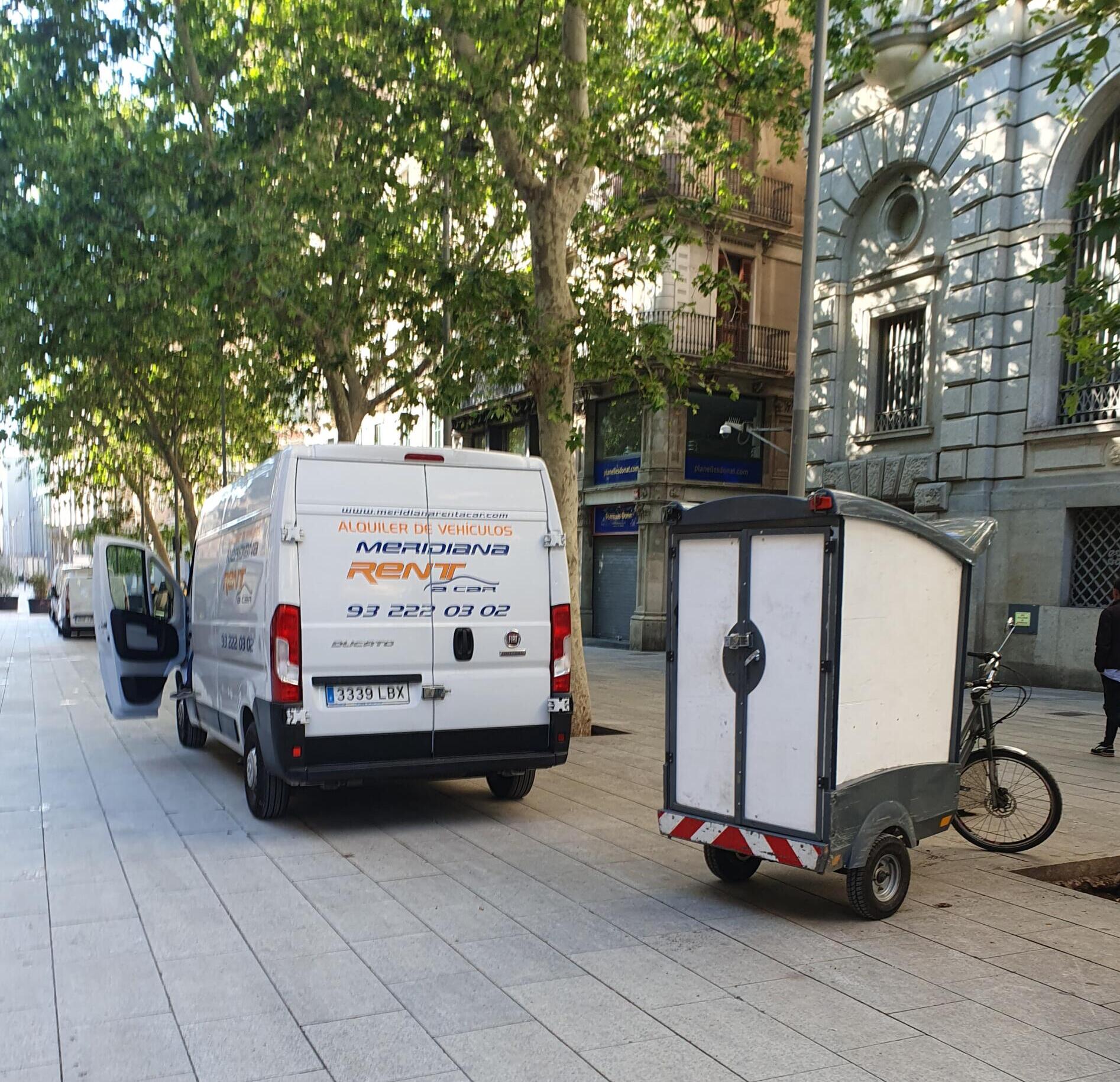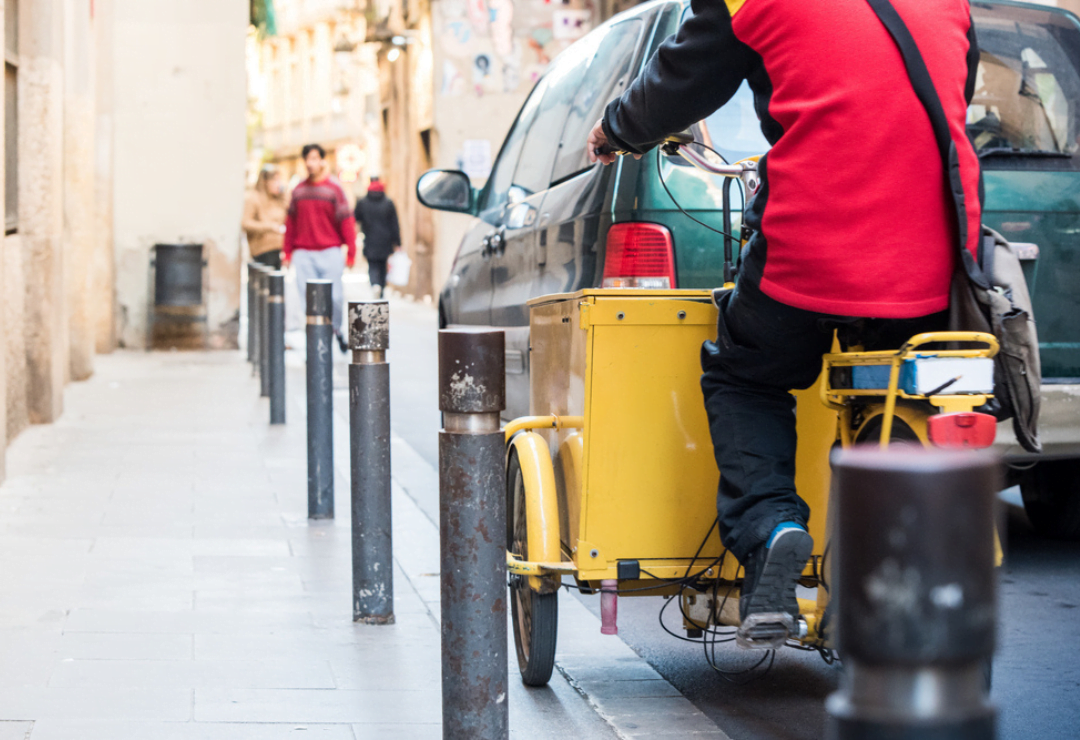Tax: Fix the Clicks!
In the heart of Barcelona, a high-stakes struggle unfolds — the quest for public space amid a bustling cityscape. As tourism and e-commerce converge, the challenge intensifies. But the City Council is armed with an innovative solution to revitalise the urban landscape, reduce emissions, and bolster local commerce.

Delivery vehicles in main pedestrian area. Credit: Josep Manel Medrano Molina
In the vibrant streets of Barcelona, the quest for public space is reaching its limits. The city's buzzing activity, fueled by businesses, bustling shops, and tireless commuters, exerts immense pressure on the precious urban expanse. But that is not all — the tide of tourism and its associated sectors adds an extra layer of strain, not just on mobility but also on the very fabric of the city's communal areas. Think of the charming terraces spilling out from bars and restaurants, each claiming its piece of the public stage. It is a delicate dance of utility and demand, set against the backdrop of finite space.
Yet, as Barcelona emerges from the clutches of the COVID-19 pandemic, a new challenge arises: the influx of delivery vehicles, dispatched by the ever-expanding realm of e-commerce. These vehicles clog the streets, often pollute the air with their emissions, and seemingly escape the taxman's grasp as their warehouses lie beyond the city limits. But fear not, for the City Council has recognised the urgent need for action, armed with limited tools but unwavering determination.
Faced with the pressing challenges of limited public space and a bustling city, Barcelona's City Council has recognised the need for decisive action. Mindful of the constraints on local administrations, which are unable to create new taxes in Spain, the Council has devised an innovative solution. By leveraging the power to introduce fees related to services or the private use of public space, Barcelona aims to reclaim and enhance its urban landscape. The resounding approval of this proposal by the Municipal Council on February 24, 2023, with broad support from the majority of represented parties, signals a unified commitment to improving the city's livability.
The true potential of public space
Barcelona's bold initiative — a measure that defies convention and embraces the future, seeks to unlock the true potential of public space. How, you may wonder? By reshaping e-commerce delivery habits and rekindling the flames of traditional commerce, a time-honoured cornerstone of vibrant neighbourhoods. Picture a city with reduced congestion, enhanced mobility, and fewer delivery vehicles vying for a slice of the public pie. But it does not end there. Barcelona envisions a transformative shift towards alternative means of parcel collection — lockers, convenience points, and innovative urban distribution centres that champion sustainability and the coveted last-mile delivery.
Embracing environmental responsibility, the measure takes aim at the rampant emissions polluting Barcelona's streets. While fleet transformations loom on the horizon due to impending national and European restrictions, the city refuses to wait. Delivery vehicles, among the primary culprits of the city's vehicular emissions, face the city's resolve to curb their impact, and there is even talk of tailoring the fiscal measures to incentivise fleet transformation, a clever nod to a future where clean, green deliveries reign supreme.
Order amidst the chaos

Central area is collapsed every day by delivery vehicles. Credit: Josep Manel Medrano Molina
But this measure is not just about tackling congestion and emissions; it is a call to arms for citizens to embrace a new way of consuming. The regulation strives to shift hearts and minds, guiding Barcelonians toward a commerce model anchored in proximity. By allocating tax revenue to the digitalisation of traditional commerce, the City aims to level the playing field, empowering local businesses to flourish in the face of the e-commerce juggernaut. It is a rallying cry to cherish the inherent advantages of communal brick-and-mortar establishments, offering social connections, personalised experiences, and a sense of belonging.
Furthermore, this first-of-a-kind move holds yet another tantalising prospect — the chance to reclaim and reevaluate public space. Barcelona, long plagued by indiscipline, is determined to introduce a touch of order amidst the chaos. Illegally parked vehicles will be tamed, unregistered operations scrutinised, and accountability restored. The city yearns for a balance between freedom and structure, ensuring the public space is cherished and respected.
Just the beginning
1 March 2023 marked the dawn of a new era as the City Council's vision transformed into reality. Though the regulation is intricate, the City's forward-thinking approach allowed for flexibility in defining convenience points and urban delivery centres. Collaborative efforts and consensus-building were deemed paramount, allowing all stakeholders to have their say. However, navigating the path to implementation was no easy feat. Some company associations voiced opposition, challenging the newly minted regulations and putting them to the test. But Barcelona's unwavering spirit and resolve carried the day.

Fossil fuel vehicles and sustainable vehicles. Credit: Josep Manel Medrano Molina
With the measure firmly in place, Barcelona embarks on a thrilling journey of optimising public space and unearthing its true potential. But this is just the beginning.
Barcelona's urban pioneers seek to venture further, exploring cutting-edge tools that can capture real-time data, breathing life into the City's spatial narrative. Armed with this invaluable information, the City can fine-tune its tax system, ensuring fairness and proportionality based on operators' actual activities and the externalities they bring to the table. It is a harmonious dance of innovation and regulation, all in the name of a vibrant, thriving Barcelona where public space is treasured, commerce thrives, and the soul of the city shines brighter than ever before.
Click here to read the article in its original format.
About the author:
Josep Manel Medrano Molina is a PhD in law at Bologna University and has been working as a civil servant at the Barcelona City Council since 2010. He has developed his administrative career in different positions, now as Strategic Planning and Taxation Director, in the Budget and Fiscal Policy Office.
